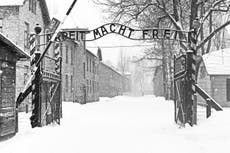‘Shocking and saddening’: Nearly two-thirds of millennial and Gen Z Americans unaware 6 million Jewish people murdered in Holocaust
Survey questioned 1,000 respondents nationwide and 200 interviews in each state
Your support helps us to tell the story
From reproductive rights to climate change to Big Tech, The Independent is on the ground when the story is developing. Whether it's investigating the financials of Elon Musk's pro-Trump PAC or producing our latest documentary, 'The A Word', which shines a light on the American women fighting for reproductive rights, we know how important it is to parse out the facts from the messaging.
At such a critical moment in US history, we need reporters on the ground. Your donation allows us to keep sending journalists to speak to both sides of the story.
The Independent is trusted by Americans across the entire political spectrum. And unlike many other quality news outlets, we choose not to lock Americans out of our reporting and analysis with paywalls. We believe quality journalism should be available to everyone, paid for by those who can afford it.
Your support makes all the difference.Nearly two-thirds of young American adults are not aware that six million Jewish people were killed during the Holocaust, according to a new survey.
The survey, carried out on adults between the ages of 18 and 39 across all 50 states in the US, showed “a worrying lack of basic Holocaust knowledge” in its respondents.
The Conference on Jewish Material Claims Against Germany (Claims Conference), who commissioned the survey, revealed that 11 per cent of US Millennial and Gen Z respondents believe Jewish people caused the Holocaust.
Examining Holocaust denial, results showed that 10 per cent of people said that the tragedy did not happen or were not sure. In total, 23 per cent either said the Holocaust was a myth, was "greatly exaggerated" or were not sure.
Almost half (48 per cent) of national survey respondents could not name one of the more than 40,000 camps and ghettos that were established in Europe during the Holocaust, with 56 per cent unable to identify Auschwitz-Birkenau.
“The results are both shocking and saddening and they underscore why we must act now while Holocaust survivors are still with us to voice their stories,” said Gideon Taylor, President of the Claims Conference.
“We need to understand why we aren’t doing better in educating a younger generation about the Holocaust and the lessons of the past. This needs to serve as a wake-up call to us all, and as a road map of where government officials need to act.”
The survey showed that 63 per cent of respondents did not know that six million Jewish people were murdered and that 36 per cent thought that “two million or fewer” Jewish people were killed.
The Claims Conference, who seek to “provide a measure of justice for Jewish Holocaust victims”, expressed fear over the results “as fewer and fewer Holocaust survivors – eyewitnesses to a state-sponsored genocide – are alive to share the lessons of the Holocaust.”
The survey seemingly exposed the role of social media in perpetuating ideas of Holocaust denial with just shy of half of the respondents (49 per cent) saying they had seen Holocaust denial or distortion posts on social media or elsewhere online.
Thirty per cent said they had seen Nazi symbols on their social media platforms and, or, in their communities.
Worryingly, 59 per cent of respondents indicate that they believe something like the Holocaust could happen again.
The survey calculated a Holocaust “knowledge score” by using the percentage of Millennials and Gen Z adults who had: “definitively heard about the Holocaust,” could name at least one concentration camp, death camp, or ghetto, and know that six million Jewish people were killed in the Holocaust.
Arkansas has the lowest Holocaust knowledge score with only 17 per cent of respondents fulfilling the criteria, followed by Mississippi (18 per cent) and Florida (20 per cent). Wisconsin (42 per cent), Minnesota (37 per cent) and Massachusetts (35 per cent) ranked the three highest out of the 50 states.
A taskforce comprised of Holocaust survivors as well as historians and subject matter experts from museums, educational institutions and leading nonprofits in the field of Holocaust education was set up by the Claims Conference to oversee the survey.
The Claims Conference urged that increased education on the Holocaust is needed to combat the findings and said that social media platforms need to take responsibility for removing Holocaust denial content from their websites.
The survey noted that 80 per cent of all respondents believe that it is important to continue teaching about the Holocaust, in part, so that it does not happen again.
Interviews were carried out with 1,000 respondents nationwide and 200 interviews in each state with adults ages 18 to 39 via landline, cell phone, and online interviews.
Greg Schneider, executive vice president of the Claims Conference told NBC News that “the most important lesson is that we can't lose any more time."
"If we let these trends continue for another generation, the crucial lessons from this terrible part of history could be lost."






Join our commenting forum
Join thought-provoking conversations, follow other Independent readers and see their replies
Comments